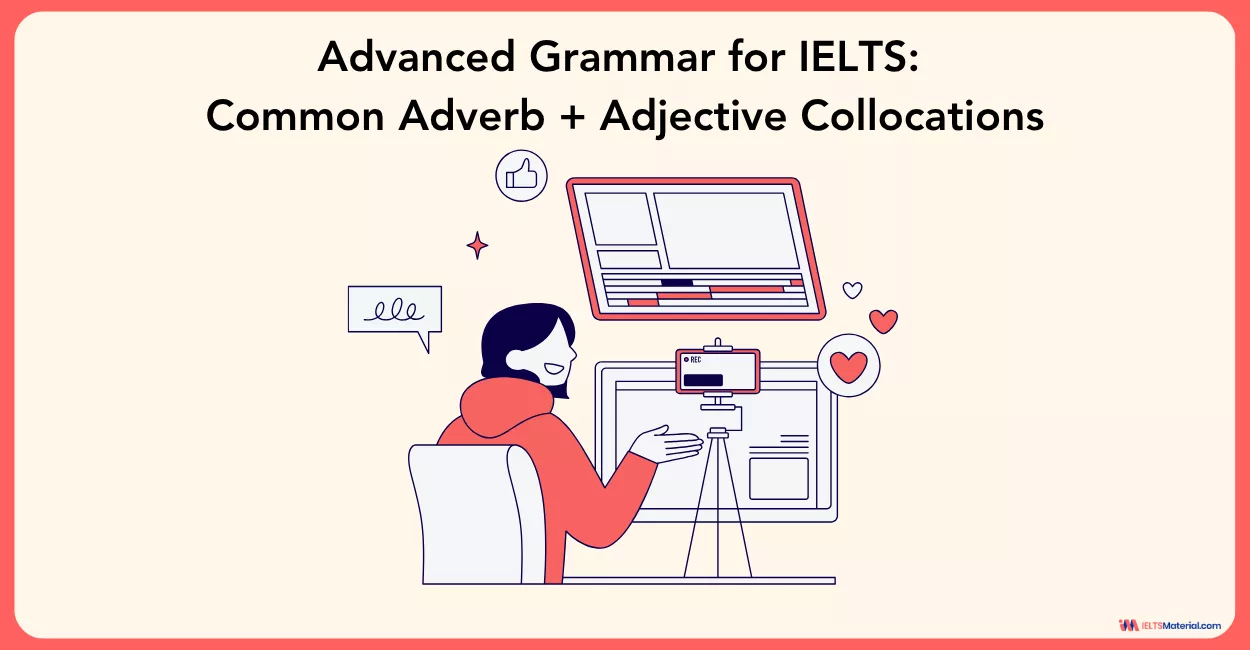Advanced Grammar for IELTS: Common Adverb + Adjective Collocations
4 min read
Updated On
-
Copy link
This blog explores the common adverb + adjective collocations to boost your IELTS grammar and vocabulary. This is ideal for IELTS Writing and Speaking to reach the score of Band 7+.
Table of Contents

Limited-Time Offer : Access a FREE 10-Day IELTS Study Plan!
If you aim to score Band 7.0 or higher in the IELTS Writing and Speaking sections, mastering advanced grammar and vocabulary is essential. One effective way to demonstrate a strong command of English is by using adverb-adjective collocations, natural word pairings that enhance fluency and coherence.
This article will explore the most common adverb + adjective collocations, explain why they’re important for the IELTS exam, and provide practice examples to boost your accuracy and confidence.
Why Use Adverb + Adjective Collocations in IELTS?
In both IELTS Writing Task 2 and Speaking Part 2, examiners assess your ability to use a wide range of vocabulary naturally and accurately. One of the best ways to sound more native-like and precise is to use common collocations, especially combinations of adverbs and adjectives that regularly go together.
Using collocations:
- Improves lexical resource (a key band descriptor)
- Adds natural fluency and flow to your responses
- Reduces awkward or unnatural phrasing
- Helps avoid repetition by expanding expression range
Struggling with collocations or grammar patterns? Book a FREE IELTS demo class and get expert help!
What are Adverb + Adjective Collocations?
Adverb + adjective collocations are combinations where an adverb modifies an adjective in a way that's commonly accepted and widely used in English. For example, we say “deeply disappointed” or “utterly useless”, but not “strongly disappointed” or “very useless”.
Below is a list of advanced and commonly tested adverb + adjective collocations, many drawn from the British National Corpus, ideal for IELTS candidates.
Common Adverb + Adjective Collocations for IELTS
The following are some of the common adverb + adjective collocations that can be used in the IELTS Writing and IELTS Speaking.
1. Bitterly + [Adjective]
- bitterly cold, bitterly disappointed, bitterly divided, bitterly hostile, bitterly hurt, bitterly opposed, bitterly resentful, bitterly upset
- Example: She was bitterly disappointed by the test results.
2. Completely + [Adjective]
- completely different, completely drained, completely immune (from/to sth), completely incapable, completely lost, completely revised
- Example: His opinion was completely different from the rest.
3. Deeply + [Adjective]
- deeply ashamed, deeply attached (to sb/sth), deeply conscious, deeply depressed, deeply disturbed, deeply embedded, deeply involved
- Example: She is deeply involved in community work.
4. Entirely + [Adjective]
- entirely absent, entirely beneficial, entirely false, entirely free, entirely loyal, entirely unexpected
- Example: The explanation was entirely logical and convincing.
5. Heavily + [Adjective]
- heavily armed, heavily built, heavily censored, heavily polluted, heavily taxed, heavily protected
- Example: The report was heavily censored before release.
6. Hideously + [Adjective]
- hideously ugly, hideously expensive, hideously embarrassing, hideously injured, hideously deformed
- Example: The furniture was hideously expensive for its quality.
7. Highly + [Adjective]
- highly respected, highly controversial, highly educated, highly skilled, highly unlikely, highly trained
- Example: He is a highly skilled technician with years of experience.
8. Painfully + [Adjective]
- painfully aware, painfully shy, painfully obvious, painfully slow, painfully sensitive
- Example: She was painfully shy during her IELTS Speaking exam.
9. Perfectly + [Adjective]
- perfectly reasonable, perfectly capable, perfectly balanced, perfectly understandable, perfectly
- Example: Your answer is perfectly valid in this context.
10. Seriously + [Adjective]
- seriously damaged, seriously ill, seriously threatened, seriously impaired, seriously undermined
- Example: The building was seriously damaged in the storm.
11. Totally + [Adjective]
- totally abandoned, totally embarrassed, totally harmless, totally unacceptable, totally destroyed
- Example: His behaviour was totally unacceptable in a formal setting.
12. Utterly + [Adjective]
- utterly alone, utterly appalled, utterly careless, utterly useless, utterly fearless, utterly tragic
- Example: I felt utterly alone after moving to a new city.
Book a FREE Online Webinar with Our IELTS Experts to Learn More Tips and Techniques for IELTS!
Practice Exercise: Complete the Collocations
Instructions: Choose the correct adverb (A–C) that naturally forms a collocation with the adjective in each sentence.
Example (0):
The city was ___ polluted due to industrial waste.
A. Bitterly
B. Highly
C. Heavily ✅
1. She was ___ ashamed after forgetting her speech.
A. Deeply
B. Totally
C. Hideously
2. The hotel was ___ overpriced for what it offered.
A. Painfully
B. Utterly
C. Hideously
3. The environment is ___ threatened by illegal deforestation.
A. Seriously
B. Perfectly
C. Entirely
4. The house looked ___ abandoned, with broken windows and overgrown grass.
A. Utterly
B. Painfully
C. Highly
5. His reaction to the news was ___ unexpected.
A. Deeply
B. Entirely
C. Heavily
6. The student gave a ___ reasonable explanation for the delay.
A. Perfectly
B. Painfully
C. Utterly
7. He is ___ trained to handle emergency situations.
A. Bitterly
B. Highly
C. Totally
8. She was ___ depressed after failing the exam twice.
A. Heavily
B. Deeply
C. Completely
9. Their decision was ___ unjustified and irrational.
A. Totally
B. Painfully
C. Highly
10. The movie was ___ embarrassing to watch with parents.
A. Seriously
B. Hideously
C. Bitterly
Answer Key:
- Deeply
- Hideously
- Seriously
- Utterly
- Entirely
- Perfectly
- Highly
- Deeply
- Totally
- Hideously
Ready to boost your IELTS score? Download our free IELTS Grammar Guide and start practicing today!
Overall, mastering adverb + adjective collocations is a smart way to demonstrate advanced grammar knowledge in IELTS. These pairings can significantly enhance your fluency, accuracy, and naturalness, especially in IELTS Writing Task 2 and Speaking responses. Practice using them regularly in context, not just in isolation.
Also Check:

Start Preparing for IELTS: Get Your 10-Day Study Plan Today!
Recent Articles

Nehasri Ravishenbagam

Prity Mallick

Kasturika Samanta





Post your Comments
1 Comment